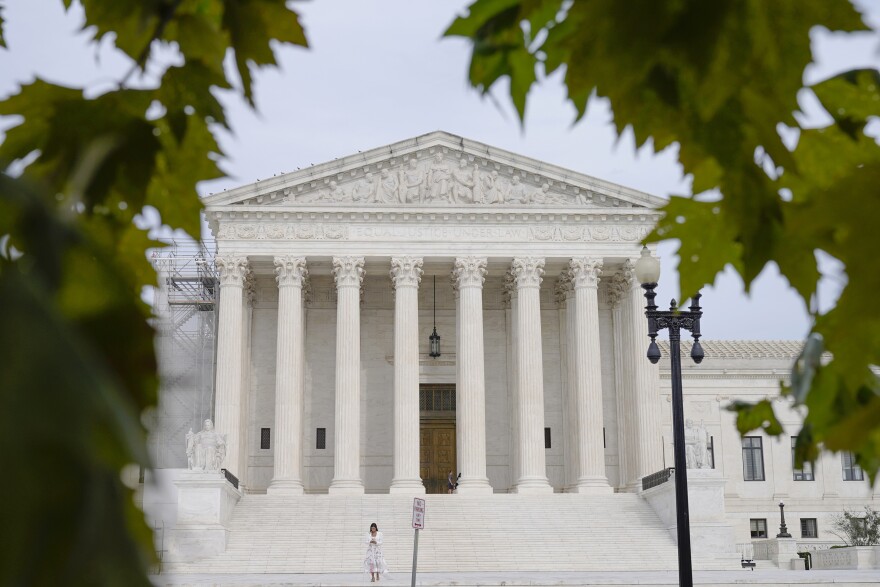Thursday’s arguments in the U.S. Supreme Court over former President Trump’s access to the Colorado ballot will have direct implications for a nearly identical legal battle in Maine.
Maine Public’s State House correspondent Kevin Miller joined All Things Considered Host Robbie Feinberg to talk about what they might mean for Maine.
Note: This interview has been lightly edited for clarity.
Robbie Feinberg: So Kevin, perhaps we should start off by reminding listeners about what’s happening here in Maine, and how it does relate to this Colorado case.
Kevin Miller: So last year, four voters here in Maine challenged Trump’s eligibility to participate in the state’s Republican primary under the insurrection clause of the U.S. Constitution, and that’s the same exact clause at the center of the Colorado case. Secretary of State Shenna Bellows then ruled that Trump’s name shouldn’t appear on the ballot because of his role in the January 6th attacks on the U.S. Capitol. The two sides presented almost identical evidence in both Colorado and Maine, and Secretary Bellows based most of her decision on the Colorado Supreme Court decision barring Trump from the ballot.
Now our process is different than Colorado’s and, as a result, the case here in Maine hasn’t reached the U.S. Supreme Court yet. But again the constitutional issues are pretty much the same. And Trump’s campaign appealed Shenna Bellows’ decision in state court. And both a Superior Court judge and Maine’s highest court have basically put the case on hold until the U.S. Supreme Court rules in Colorado.
And did Maine come up at all during today’s oral arguments?
No it didn’t. But the justices were clearly thinking about how this Colorado case would affect ballot access in other states. There were a lot of examples of justices raising these concerns with the attorneys representing Colorado’s side of the case. And here’s just one in which we hear Justice (Elana) Kagan going back and forth with attorney Jason Murray, who was representing Colorado voters who challenged Trump’s eligibility.
Justice Kagan: "What’s a state doing, deciding who other citizens get to vote for for president?"
Attorney Murray: "Colorado is not deciding who other states get to vote for president. It’s deciding its own electors under Article II power. And the constitution grants them that broad power . . ."
Kagan: "But the effect of that is obvious, yes?"
Murray: "No, you’re honor. Because different states can have different procedures. Some states may allow insurrectionists to be on the ballot."
And like I said, that was just one of multiple examples of this line of questioning that we heard
What do you think we should take away from those kinds of exchanges?
Well, I’m certainly no expert on the Supreme Court. I’ll leave that analysis to the Nina Totenbergs of the world. But it seemed pretty clear to me and to many other observers that both the conservative justices and the liberal justices were uncomfortable with this idea that one state – in this case Colorado – should decide who can run for president.
Some of the justices really seemed to suggest that could disenfranchise voters in other states, while other justices raised the specter that other states would respond by removing other candidates (presumably President Biden) from their ballots. And they were basically saying this could create an even more chaotic system as we head into November. But we have no idea how the court will come down on this – and whether that decision will be narrowly tailored to apply only to Colorado or whether it will apply to other states, like Maine.
So you mentioned earlier, the ballot case here in Maine has been put on hold, pending the outcome of this Colorado case at the Supreme Court. And the Republican primary is coming right up here in Maine. So what will all this mean for GOP primary voters here in the state and what they see on their actual paper ballots?
So early absentee voting is already happening in Maine – it actually started this week. And Trump is listed as one of the candidates on the ballot. Secretary of State Bellows had suspended enforcement of her decision because she knew there would be appeals. And while she had urged the state courts not to wait until the Supreme Court ruling on the Colorado case, that obviously didn’t happen.
I will just add that in the seemingly unlikely scenario that the Supreme Court rules that Trump is ineligible to run in Colorado – and therefore in Maine – election officials would have to post notices inside the voting booths saying that a vote for Trump wouldn’t count. But we would cross that bridge when we got to it.
And has Secretary of State Bellows said anything about the arguments today?
Yeah, so I checked in with her office and was told that she wasn’t doing any interviews this afternoon. But obviously they were paying attention. And in a statement from her office, Bellows said that she welcomed a Supreme Court ruling in the Colorado case . . . and that she hopes the ruling will “answer the important 14th Amendment questions for all the states.”
And so I guess the big question is: what happens from here?
Well, I guess we all kind of sit back wait. It seems there are so many different avenues the Supreme Court could go down with their ruling – and there are other cases still pending, including this other big federal case about whether Trump should somehow be immune from prosecution for anything he did as president. But whatever the Supreme Court rules, the courts here in Maine have instructed Secretary Bellows to revisit her December decision based on that ruling.



